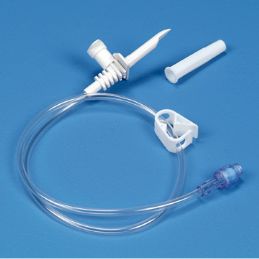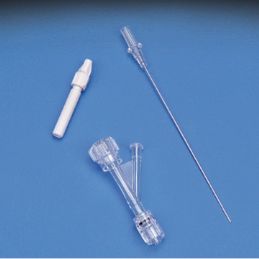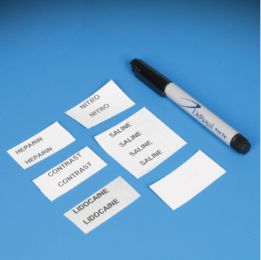


What are Cardiac Catheterization Supplies?
There are many different types of devices needed and utilized during a cardiac catheterization procedure. Injector lines are available in a variety of lengths, with or without high pressure rotating adapters. They are suitable for power injector applications in the angiography or cath lab. Contrast media (or fluid) administration sets allow for smooth, bubble-free priming of closed systems. They are available with the options of standard or large bore vented tubing, and with choices of vented or non-vented tubing.
Manifold kits are available with different pressure ratings that are measured in psi (pounds per square inch). Left or right hand configurations are available for all manifolds, and they are packaged sterile, and latex free. A standard manifold kit is comprised of a vented contrast media set, a universal macro drop set, a male to female pressure monitoring line, and a 3 port low pressure manifold. A low pressure manifold kit has 2 to 5 ports with a pressure rating of 250 psi. A medium pressure manifold kit is intended for use as an on and off device for angiography and other high pressure applications. It has a 2.3 mm diameter lumen and a pressure rating of 550 psi. A high pressure manifold kit is useful for special procedures that require power injection and small catheters. Its pressure rating is 800 psi.
Pressure transducers are available in two types, reusable or disposable. The reusable transducer can come with or without stopcocks attached, and is packaged sterile, and latex free. The disposable transducer comes with or without stopcocks attached, along with a flush device. It is ergonomically designed to fit in the palm of the hand, and the cable connector attaches and disconnects easily.
Thermodilution catheters are designed for rapid and accurate assessment of the hemodynamic status of a patient. These catheters are available with a safety wedge catheter which acts as a pressure relief valve. They come in various sizes and are packaged sterile. Thermodilution catheters are used with disposable pressure transducer kits to monitor intracardiac and intravascular pressures. They additionally provide access to blood for sampling, and infuse drugs and fluids. They can also measure cardiac output when used with an injectate system and a cardiac output computer by the thermodilution method.
What is Cardiac Catheterization?
Cardiac catheterization is a medical procedure used to diagnose and treat cardiovascular (heart) conditions. During the procedure, a long, thin tube, called a catheter, is inserted into a vein or artery of the neck, arm, or groin. It is then threaded through the blood vessels to the heart. By using this catheter, a doctor can do diagnostic tests as part of a cardiac catheterization. Some heart disease treatments are also performed using cardiac catheterization. Normally, a person is awake during this procedure, but is given medications to help stay relaxed. Recovery time is quick, and there is a low risk of complications.
Who Requires Cardiac Catheterization?
Cardiac catheterization is utilized to determine various kinds of heart problems. Or, it may be part of a procedure to correct a known heart problem. With this procedure, a doctor can locate narrowing or blockages in the blood vessels that could cause chest pain. It additionally measures pressure and oxygen levels in different parts of the heart, and checks the pumping function of the heart. Doctors can also take a sample of tissue from the heart, diagnose heart defects that have been present since birth, and look for problems with the heart valves.
To treat heart disease, cardiac catheterization is also used as part of some procedures. One procedure is angioplasty, with or without stent placement. Angioplasty involves temporarily inserting and expanding a tiny balloon at the site of a blockage. This helps to widen a narrowed artery. Angioplasty is normally combined with implantation of a small metal coil, called a stent, in the clogged artery. The coil helps prop open the artery and decreases the chance of it narrowing again.
Another procedure is the closure of holes in the heart, and fixing other congenital defects. Instead of having open-heart surgery, some congenital heart defects involving holes in the heart can be treated. This is done by threading a catheter to the hole to close it, almost like a plug. Narrow areas of blood vessels can be opened up by a balloon. Afterwards, a stent is normally put in place to keep the blood vessel open.
Repairing or replacing heart valves often employs cardiac catheterization, as well. A leaking or narrowed heart valve can sometimes be repaired or replaced by a doctor. Also, doctors can use catheterization to fix a leaking replacement valve. Balloon valvuloplasty is another procedure that can open narrowed heart valves by threading a balloon-tipped catheter to the part of the heart valve that is narrowed by inflating it.
Heart arrhythmia treatment, also called ablation, is a procedure used to treat heart rhythm problems. A laser, radiofrequency energy (heat), or nitrous oxide (extreme cold) can be applied to abnormal heart tissue through the tip of a catheter. This is done to destroy diseased areas or to reroute electrical signals that are causing the heart rhythm disorder. Another procedure is to close off a part of the heart to prevent blood clots. In addition to closing holes in the heart, cardiac catheterization can also be used to close off the part of the upper chamber of the heart, which is called the left atrial appendage. This area of the heart is known to develop blood clots during irregular heart rhythms. Atrial fibrillation is one type of this irregularity. Instead of taking blood thinners, closing it off is an alternative.
Rehabmart is proud to offer a wide variety of superior quality cardiac catheterization supplies from our esteemed vendor, DeRoyal.
Hulet Smith, OT
Rehabmart Co-Founder & CEO
lb